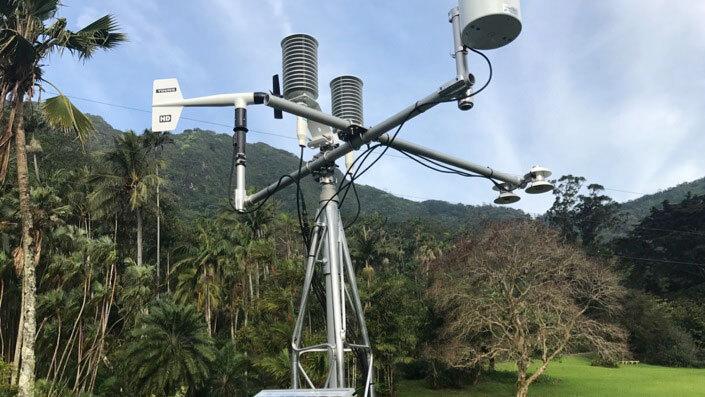UH Receives $1.3 Million Grant for Project Deploying 84 Climate Stations

The National Science Foundation awarded a $1.3 million grant to University of Hawaiʻi at Mānoa researchers for a project to better understand and forecast the complex weather and climate of the Hawaiian Islands.
The “Hawaiʻi Mesonet” project involves deploying 84 climate stations to collect critical real-time data, including rainfall, air temperature, humidity, wind speed and direction, solar and net radiation, and soil moisture, heat flux and temperature.
The mesonet, or mesoscale network, refers to a densely located set of observational stations, which each have a data logger, power supply with solar charging and a telecom device allowing for real-time data transmission.
This is the first time the National Science Foundation has funded a mesonet system under its highly competitive Major Research Instrumentation (MRI) Program.
“Well, it’s a game changer for us,” said the projectʻs principal investigator Thomas Giambelluca, UH Water Resources Research Center director and Department of Geography and Environment professor.
“What we do is look at patterns of climate, how weather and climate change over space, how it’s different from windward to leeward, how it’s different from sea level to high elevations and also how it’s changing through time.”
The Hawaiʻi Mesonet will help researchers, weather forecasters, farmers, conservation organizations and many others by providing high-quality, comprehensive measurements over the entire state. Climate differences found in Hawaiʻi are equivalent to those of a continent, but compressed into the small area of the islands. For example, rainfall changes from 20 to 400 inches per year occur over a distance of just 12 miles.
Long-term observational data are unavailable from many locations that would provide valuable information relevant to atmospheric science, hydrology and ecosystems science. Hundreds of existing rain gauges are not enough and not located in all the right places. Many also are not equipped to send out the data. In addition, temperature, humidity, wind speed, solar radiation and other variables are measured at relatively few locations.
Additional details:
- The research team is seeking landowners willing to offer their area to host a weather station and landowners or other community members willing to help the team maintain the stations over time. Those interested in assisting with the project may contact Giambelluca at HCDP@hawaii.edu.
- The researchers have three project goals: 1) Predict the chances thunderstorms may form by a process called convective initiation. 2) Identify water basin storage thresholds to better estimate the risk of flooding to low-lying areas. 3) Discover the interactive effects of temperature, moisture and solar radiation on ecosystems.
- Data will also be used to form the Hawaiʻi Climate Data Portal where users — including weather forecasters — can receive real-time data.
- UH researchers will also submit data to the National Mesonet Program supported by the National Oceanic and Atmospheric Administration.
- Students and researchers will gain hands-on field experience in instrument installation, calibration and maintenance.
- The data collected will be incorporated in classes and the researchers will work with programs intended to boost the involvement of Native Hawaiian students in research.






